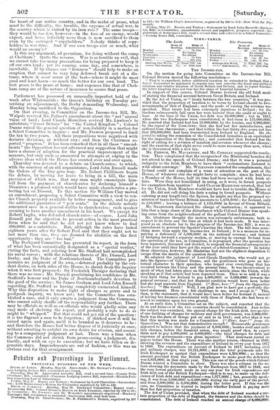Parliament has possessed an unusually imperfect hold of the week
after Whitsuntide; the Queen's birthday on Tuesday pre- scribing an adjournment, the Derby demanding Wednesday, and Monday being sacrificed to the Opposition. On that evening, in Committee on the Income-tax Bill, Mr. Walpole revived Mr. Palmer's amendment about the " net" annual value of land ; Lord Claude Hamilton revived Mr. Lawless's to substitute " Great Britain" for " the United Kingdom " ; Colonel Dunne raised the general question of non-liability in a motion for a Select Committee to inquire ; and Mr. Frewen proposed to limit the tax to two years. All these propositions were negatived with decisive divisions, or without any ; and then the Chairman re- ported " progress." It has been remarked that in all these " amend- ments" the Opposition has not advanced any suggestion that might have a chance of adoption for the practical improvement of the measure, but only such as amounted to attempts at edging in the adverse ideas which the House has scouted over and over again.
Thursday was devoted to a debate on Church-rates; to which, with the courtesy of an old acquaintance, Lord John Russell made the Orders of the Day give way. Mr. Robert Phillimore began the debate, by moving for leave to bring in a bill, the main provision of which was, that any man might emancipate him- self from the payment of church-rates by declaring himself a Dissenter ; a proposal which would have made church-rates a pro- tecting tax on Dissent. To this motion Sir William Clay moved an amendment, proposing a Select Committee with a view to ren- der Church property available by better management, and to give the additional guarantee of " pew-rents." In the debate nobody concurred save in a general dislike to church-rates; each speaker seeming to have another amendment in his heart. We except Sir RobertInglis, who defended church-rates—of course. Lord John Russell put the objection to present action in the most practical form when he said that he did not yet know where to find 300,0004 as a substitute. Bat, although the rates have lasted eighteen years after Sir Robert Peel said that they ought not to last more than one, they are doomed for abolition on the first opportunity : they are " too bad." The Dockyard Committee has presented its report, in the form of what has been sarcastically designated as a " special verdict," stating the facts, and relating how Mr. Stafford had accomplished his naval career; with the relations thereto of Mr. Disraeli, Lord Derby, and the Duke of Northumberland. The Committee pro- nounces no judgment of its own,—deterred probably by the evi- dent desire, on both sides of the House, to shrink from the inquiry when it was first proposed ; Sir Frederick Thesiger declaring that there was no case ; Mr. Disraeli proclaiming his confidence in Mr. Stafford's honour and the Duke of Northumberland's devotion to the good of the service ; Sir James Graham and Lord John Russell regarding Mr. Stafford as having completely exonerated himself. Why this disposition to make light of charges so grave and to poohpooh inquiry, we know not; but the Committee has esta- blished a case, and it only awaits a judgment from the Commons, who cannot safely shuffle off the responsibility any further. There may be officials as well as ex-officials who would gladly seize any easy mode of shelving the report, and probably a vote to do so might be " whipped." But that could not get rid of the question: it is too flagrant a case to be forgotten ; if shirked now it will be raised again and again, until it be branded as it deserves to be : and therefore the House had better dispose of it judicially at once, without awaiting to exhibit its own desire for evasion, and assent- ing to a compulsory judgment at last. There was a time when the Commons did not shrink from pronouncing a judgment, dis- tinctly, and with an eye to execution; but we have fallen on de- generate days. Impeachments are out of fashion, or this was an obvious case for that arraignment.


































 Previous page
Previous page